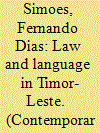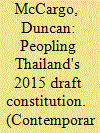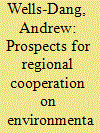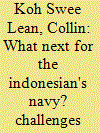|
|
|
Sort Order |
|
|
|
Items / Page
|
|
|
|
|
|
|
| Srl | Item |
| 1 |
ID:
142007


|
|
|
| 2 |
ID:
142081


|
|
|
|
|
| Summary/Abstract |
As in other post-conflict states, the international community has been actively promoting the implementation of the rule of law in Timor-Leste. The justice system remains the weakest branch of Timor-Leste’s governance architecture. The effectiveness of the justice system is hampered by the fact that laws and proceedings are not always translated into languages understood by all court actors. Timor-Leste has a long history of multilingualism, with at least sixteen language varieties being spoken in the country. Both Tetum and Portuguese are official languages, with Portuguese being predominantly used in the courts, even though less than 10 per cent of the population is fluent in the idiom. The post-colonial legacy was one of two separate legal systems — the formal legal system and the traditional system — operating in parallel. More than a decade after independence, the former continues to have only a peripheral presence in the lives of most East Timorese. This gap between the language of the people and the language of the courts heightens the challenges to nation- and state-building in Timor-Leste. The purpose of this article is to examine the current language policy in Timor-Leste and discuss possible avenues for strengthening the formal justice system in a multilingual environment.
|
|
|
|
|
|
|
|
|
|
|
|
|
|
|
|
| 3 |
ID:
142079


|
|
|
|
|
| Summary/Abstract |
In the wake of the 22 May 2014 military coup, Thailand began drafting its twentieth constitution since 1932. But the drafting process was dogged from the start by fundamental differences between the military junta and legal experts working on the new constitution. The military wanted to invoke “the people”, yet at the same time suppress their actual political participation. The constitution drafters wanted to create “active citizens” who were loyal to conservative, royalist notions about Thailand’s state and society, hoping they would be mobilized to police those notions, and so undermine those forces supporting a more open democratic politics. In the end, attempts to craft a charter shaped by legalistic ideas of moral citizenship and virtuous bureaucratic rule foundered in September 2015 when the draft constitution was voted down by the National Reform Council, a body whose members had been appointed by the junta itself. This article examines what was at stake in the struggles over the meanings of Thailand’s 2015 draft constitution, arguing that the junta deliberately sabotaged a constitution which embodied a view of the populace that was radically at variance with military preferences.
|
|
|
|
|
|
|
|
|
|
|
|
|
|
|
|
| 4 |
ID:
142082


|
|
|
|
|
| Summary/Abstract |
Environmental Impact Assessment (EIA) is a central process in sustainable development to mitigate the anticipated impacts of development projects. Every national government in mainland Southeast Asia has, or is in the process of developing, legislation on environmental governance and shares a common interest in implementing and enforcing EIA. Yet despite the fact that significant environmental impacts occur across borders, no multi-country EIA agreements have yet been passed and implemented. Increased regional cooperation could present an opportunity to address this gap, potentially linked to ASEAN or other regional organizations. Based on this hypothesis, a consultative research process under the auspices of the Mekong Partnership for the Environment interviewed 127 key stakeholders in five countries (Cambodia, Laos, Myanmar, Thailand, and Vietnam) to assess the positions, levels of influence and readiness to cooperate on EIA principles and standards. Using a political economy approach, the research team found strong support among government and non-governmental stakeholders alike for reform of national EIA procedures, increased public participation and the development of regional EIA standards. At present, government officials in some countries favour increased cooperation, while others express reservations and concerns about the value of such cooperation. The article explores the underlying interests and incentives behind these varied standpoints and concludes with a discussion of possibilities for regional institutions, national governments and donor agencies to advance cooperation on environmental governance.
|
|
|
|
|
|
|
|
|
|
|
|
|
|
|
|
| 5 |
ID:
142084


|
|
|
|
|
| Summary/Abstract |
This article discusses the sovereignty concerns of the government of the Lao People’s Democratic Republic (LPDR) ahead of a 1985 joint cooperation agreement with the United States to account for US Prisoners of War/Missing in Action (POW/MIA) lost in Laos during the Vietnam War. It attempts to demonstrate that from the Laotian side, domestic security concerns and diplomatic factors were the main drivers of cooperation with the United States. The domestic security factor was the perceived threat of violence arising from American-supported subversive activities conducted by Thailand-based anti-LPDR resistance groups as well as private groups searching for alleged live POWs inside Laos. The diplomatic factor stemmed from Laos’ desire for the United States to respect the country’s independent foreign policymaking vis-a-vis its ally Vietnam. Drawing on primary sources, this article posits two arguments: first, the LPDR wanted to use the 1985 joint cooperation agreement to obtain compliance from the United States to end its support for both anti-LPDR resistance groups and private POW searchers; and second, to utilize POW/MIA negotiations with Washington to reaffirm Laos’ sovereignty vis-à-vis Vietnam.
|
|
|
|
|
|
|
|
|
|
|
|
|
|
|
|
| 6 |
ID:
142083


|
|
|
|
|
| Summary/Abstract |
A greenwater navy ought to be effective within its country’s immediate waters, especially the exclusive economic zone (EEZ) while also possessing a limited extra-regional force projection ability. Based on this definition, the Indonesian Navy does not adequately perform this dual role. While President Joko “Jokowi” Widodo’s Global Maritime Fulcrum (GMF) vision gives the navy’s long-term greenwater ambitions greater traction, it still faces capacity-building constraints thus prompting it to adopt the Minimum Essential Force (MEF) blueprint as an interim measure. This article examines the Indonesian Navy’s prospects of attaining its MEF targets by 2024 as part of its long-term greenwater naval ambitions commensurate with Indonesia’s “maritime medium-ness”. To identify these capacity gaps, this article models the navy’s MEF projections based on three scenarios: Standard, Optimistic and Austere. Results show that under an Austere Scenario, the navy cannot possibly achieve its MEF targets across all categories by 2024. The Optimistic and Standard Scenarios are more realistic. Gaps in certain categories, primarily the PKR-10514 light frigate programme which forms a key facet of the navy’s greenwater aspirations, are identified. But the risks of project overruns and budget challenges may militate against the modest projections derived in this study. Therefore, this article proposes a recalibration of the MEF specifications, by reducing the number of high-capability PKR-10514s optimized for warfighting in exchange for a larger force of low-capability “PKR-minus” optimized for EEZ duties.
|
|
|
|
|
|
|
|
|
|
|
|
|
|
|
|
| 7 |
ID:
142080


|
|
|
|
|
| Summary/Abstract |
Why did ASEAN create a regional human rights body? The 2008 ASEAN Charter includes the “promotion and protection” of human rights among ASEAN’s Principles and Purposes. It also declared that ASEAN would establish a human rights body. This raises an empirical puzzle given the prevailing ASEAN norm of “non-interference in the internal affairs of one another”, which traditionally has meant that human rights records are excluded as a criterion of membership of ASEAN, and as a topic for (official) dialogue. Member states have refrained from publicly criticizing one another in regard to human rights. This article argues that regional norms are shaped by competing perceptions of legitimacy. Members’ interpretations of the legitimacy of ASEAN and its norms as perceived by those outside the region — “external regional legitimacy” — were crucial in shaping the decision to establish a regional human rights body. This article makes the case that more attention should be paid to legitimacy in the study of regional norms.
|
|
|
|
|
|
|
|
|
|
|
|
|
|
|
|
|
|
|
|
|